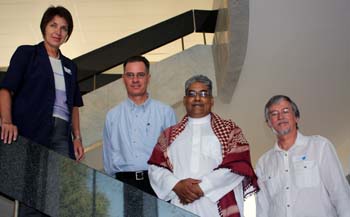
From the left are: Prof Yolanda Dreyer (Chairperson of SPTSA, University of Pretoria), Prof Johann Rossouw (UFS), Prof Hussein Solomon (UFS) and Prof Johan Cilliers (Stellenbosch University).
Photo: Michelle Nothling |
The privilege of hosting the annual meeting of the Society for Practical Theology in South Africa (SPTSA) fell to the University of the Free State (UFS) this year. Delegates from across the country recently convened on the Bloemfontein Campus to attend the event from 21 – 23 January 2015.
The three-day congress saw several high-profile keynote speakers discussing the topic of ‘Power of religion and religions of power’.
Dr Johann Rossouw from the UFS Department of Philosophy presented a paper on ‘Power, the state and the church in South Africa’. Dr Rossouw regards the cooperation between theologians and philosophers as integral to help us understand the time we live in. Twenty years since the dawn of South Africa’s democracy, “the gap between the country we were promised and the country we received is bigger than ever,” Dr Rossouw said. “A South-African Church … cannot but make her voice heard regarding this gap.”
Expert on conflict resolution and fundamentalism, Prof Hussein Solomon from the UFS Department of Political Studies and Governance scrutinised the compatibility of Islam with democracy. He warned, though, against “the labelling of a conflict as religious on the mere basis of its religious overtones.” Prof Solomon’s paper, ‘Political Islam: trends, trajectory and future prospects,’ not only advocated tolerance and political pluralism, but also pointed to the fact that it is “in the common good of all humanity” to avert a “Clash of Civilizations”.
‘God in granite?’ – Prof Johan Cilliers’ paper – investigated the phenomenon of the monumentalization of religion. Prof Cilliers from Stellenbosch University explained that monuments often have “spiritual character and iconic value, in the sense that it offers a space for the formation or discovery of meaning.” In his presentation he showed, though, that monuments – even those connected to religious motifs – “seldom escape the lure of power”.
The event was organised by the University of the Free State’s Faculty of Theology, Department of Practical Theology.
For more information or enquiries contact news@ufs.ac.za .